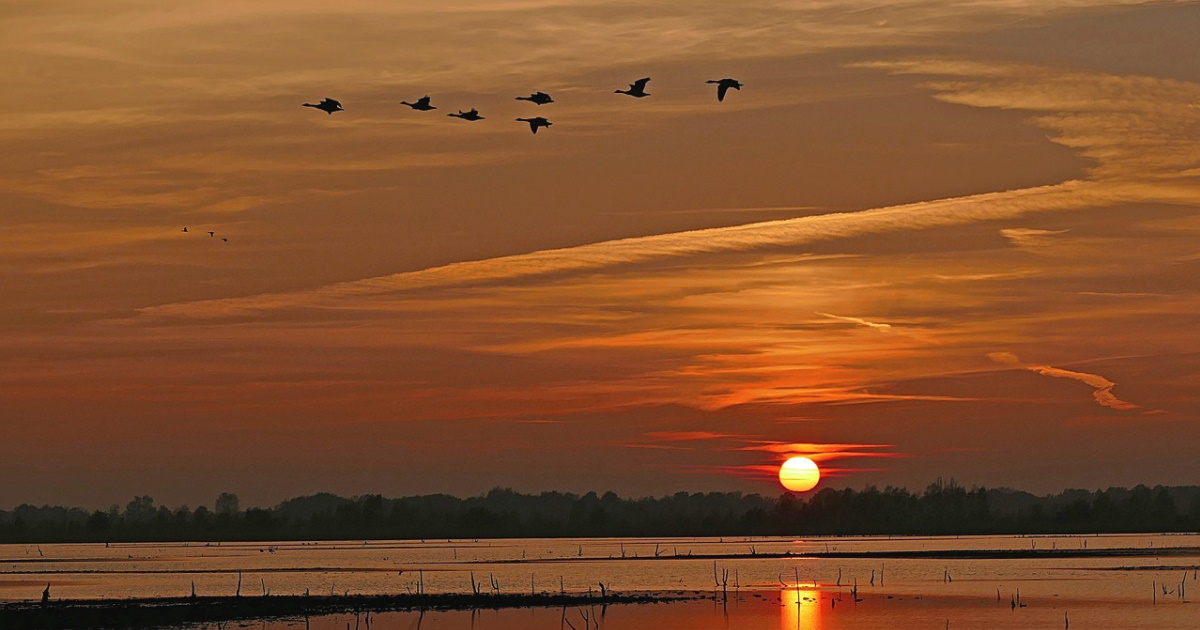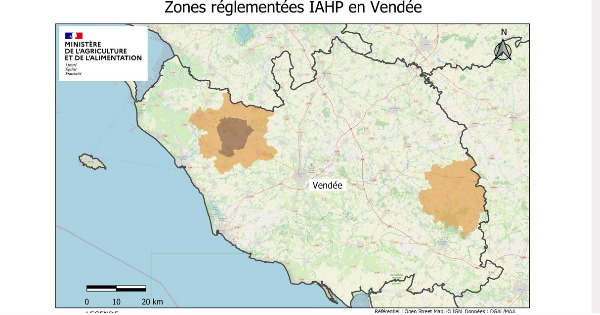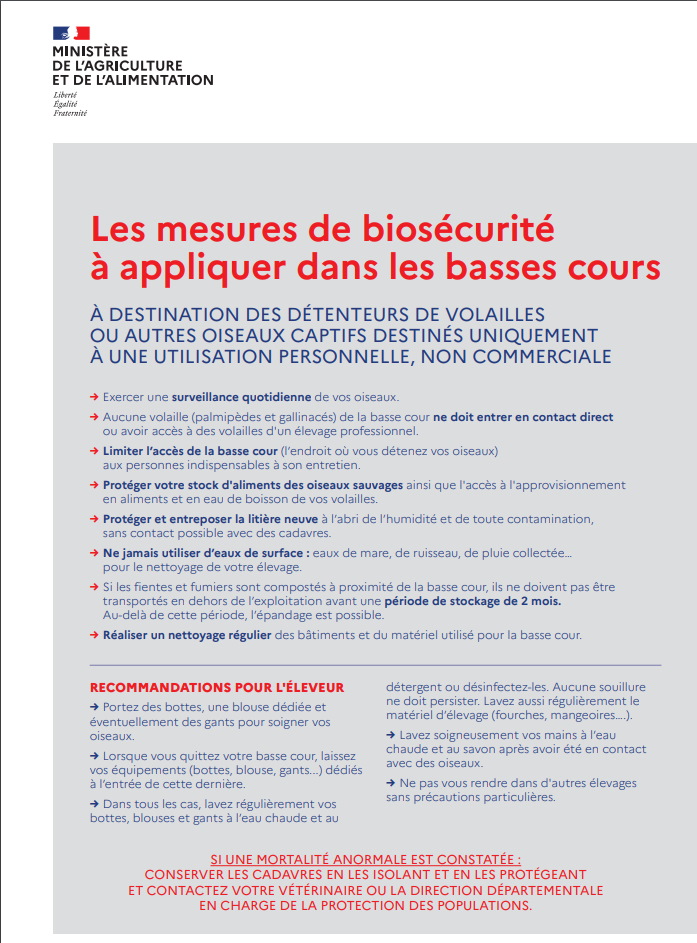
How the Bird Flu could affect us in the Vendée
What is the Avian Flu? –
Avian Influenza (or bird flu) is a highly contagious viral infection that can affect all birds and cause misc. issues depending on the pathogenicity of the virus and on the species. A Highly Pathogenic Avian Influenza (HPAI) - strain H5N8 has been detected in wild birds, especially ducks, geese and swans as well as birds of prey.
The disease is highly contagious to wild and to domestic birds in areas of wild bird migration. Symptoms are mainly neurological and easy to recognize if you happen upon a bird that was infected, but the disease is very deadly. If you have an adventurous outdoor cat who likes to catch birds, be aware that the disease is as dangerous to cats.
If you see a bird staggering about and falling over, unable to stand on its feet, or dead, it's important to inform your veterinarian immediately to investigate.
History
As early as 1878 the "bird flu" was distinguished from other diseases that caused high mortality rates in birds but until the 1950's it was more endemic (concentrated to one area.) Until the 90's outbreaks were sporadic and contained.
But from the 1990's our human consumption of poultry (chicken, turkey, duck) increased so much that the cultivation of birds grew by huge percentages worldwide.
Suddenly there was a clearer distinction between LP (Low Pathogenic = less contagious) and HP (Highly Pathogenic = highly contagious) strains of the disease. The type presenting the greatest risk is referred to as HPAI.
While the disease is transmitted from wild birds to domestic birds and farm animals through wild bird migration, the spreading of the disease on the ground is increasingly more common due to a high density of farms and the frequent transport of flocks from the intensive poultry production needed to feed us.
How is the spread of Avian flu monitored?
The monitoring of wild birds and wild bird migration is performed by the French Biodiversity Office (l’Office français de la biodiversité) and the Réseau SAGIR network, an epidemiological surveillance network for birds and wild terrestrial mammals in France, which partners with the National Office for Hunting and Wildlife. Monitoring is reinforced throughout the national territory.
Can humans be contaminated with HPAI serotype H5N8?
Recent research into the genes of the now common Spanish flu virus shows it to have genes adapted from both human and avian strains.
Further research shows that an Influenza A type of flu has the potential to be transmitted from animals to people, and in rare cases from person to person. Any virus that allows a mix of genes can create a new virus subtype (called an antigenic shift) which humans have almost no immune protection against.
As an example, in 1996, a different type pf bird flu–Influenza A/H5N1–was discovered in a goose in China and since 2003, over 700 human cases of Asian HPAI H5N1 have been reported to the World Health Organization. There is concern that an antigenic shift in an Influenza A type of flu may cause a pandemic in the future. Not exactly good news in Covid-19 times!
But currently we are dealing with a confirmed strain of H5N8 bird flu found in samples from wild birds. This strain of bird flu is considered one of the less pathogenic subtypes for human beings and no human cases have been identified.
Vendée area has many poultry farms. What does it mean for our farmers?
The farmers with poultry and other captive bird farms in any of the 45 French departments that were placed on high alert are obligated by law to apply a strict management plan or an Avian Influenza control plan consisting of clean clothes and disinfecting boots before entering livestock areas; not inviting outside persons to the farm, except e.g. a veterinarian, who must also follow the same sanitary measures etc. In case of suspected illness or deaths, farmers must notify the Vétérinaire Sanitaire without delay.
There is no cure for the disease. In case of an outbreak on a farm, unfortunately all birds are culled by using a suffocating foam that is sprayed into the barn. Then strict sanitary measures are taken to destroy the birds and to disinfect the area.
In the current outbreak across several countries, as of mid November over 300.000 birds from livestock have been eradicated to help stop the spread. In France, outbreaks have been detected in Haute-Corse (Corsica) in the week of Nov 11th 2020, and in Yvelines, a department located in the region of Île-de-France, a week later.
Current measures include the containment of domestic birds in order to avoid any contact with wild birds. Gatherings of live poultry e.g. at markets, is banned, and the release of game birds for hunting is banned. See the Ministerial Decree issued November 4th, 2020 here and more info here.
UPDATE 04/03/2021
Lifting of restricted areas including Vendée
PER THE ARTICLE RELEASED BY THE GOVERNMENT: "The measures applied in the departments where outbreaks were confirmed (Deux-Sèvres, Vendée, Ardennes) includes the slaughter of all the poultry from the infected farm and the establishment of a protection zone. 3 km around the outbreaks as well as a 10 km surveillance zone around these outbreaks. To date, the restricted areas have been lifted in Vendée, Deux-Sèvres and Ardennes."
The Avian Influenza outbreak has been stabilized in the Vendée. The protection and surveillance zones around the farms where an outbreak was confirmed and birds culled, have been lifted. Wildlife is still being monitored.
UPDATE 02/02/2021
There are THREE CONFIRMED locations (see map) now in the Vendée. Latest official report here (pdf)
No change in the situation as far as keeping the webbed birds inside as much as possible. Latest government news here.

UPDATE 18/01/202
ADDITIONAL MEASURES TAKEN IN SOUTHWEST FRANCE ANNOUNCED [source link]. They are (translated):
- Preventive felling previously carried out over a radius of 3 km around the outbreaks will now be carried out over 5 km. They will concern in the 1st kilometer all the birds of breeding and backyard, and for the following 4 km all the palmipeds and other poultry when they are not confined;
- Slaughter capacities will be significantly increased thanks to the mobilization of the service provider mandated by the State, that of health veterinarians as well as the requisition of additional slaughterhouses;
- The 10 km surveillance zone around the outbreaks could be extended up to 20 km, with a ban on the exit and entry of poultry (including to repopulate a farm which has finished its production cycle). These restrictions will be reassessed by the end of January, in the light of the epidemiological assessment.
UPDATE 10/12/2020
ALERT VENDEE: *****85120 Saint Maurice des Noues*****
In an update on December 10th 2020 [source link], on the agriculture.gouv.fr website it states (translated)
"In addition, as of December 10, France had 4 cases of HPAI in wildlife (Morbihan, Loire-Atlantique, Meurthe-et-Moselle and Calvados). The Minister of Agriculture and Food calls on all stakeholders - in particular breeders, animal shops, transporters and backyard owners - to strictly apply the protective measures provided for by the regulations in situations of high IAHP risk . As a reminder, the entire national metropolitan territory has been classified as a “high” risk level with regard to avian influenza since November 17, 2020. The following measures apply to all the departments of France and of France. Corsica :
- confinement or protection of poultry farms by a net with reduction of outdoor routes for animals;
- ban on assembling birds (examples: competitions, fairs or exhibitions);
- a ban on involving birds originating from these departments in organized gatherings;
- ban on the transport and release of game birds;
- ban on the use and transport of decoys for hunting waterfowl.
Vigilance remains imperative to prevent the spread of the virus." With another link to all measures.
IMPORTANT: the end of these measures will be announced by the French government - please do not go by what websites may deem the end of migratory season. In conclusion, as of 10th December, nothing has changed and all measures remain in effect. To translate an article to your default language, on the computer, right-click your mouse and click 'translate to...." in the pop-up box.
What about the bird flu and keeping chickens?
As a keeper of chickens or geese or other birds, it is obligatory to indicate this here. Further measures to be respected by the Government (translated): aan te geven. Verdere maatregelen die moeten worden nageleefd per de regering (vertaald):
Biosecurity measures to be applied in FOR POULTRY KEEPERS OR OTHER CAPTIVE BIRDS INTENDED SOLELY FOR PERSONAL, NON-COMMERCIAL USE
- Monitor your birds on a daily basis.
- No poultry (palmipeds and gallinaceous) in the backyard should come into direct contact with the birds. or have access to professionally reared poultry.
- Limit access to the farmyard (the place where you keep your birds) to the people essential to its maintenance.
- Protecting your food stock from wild birds and access to supplies in food and drinking water for your poultry.
- Protect and store new litter away from moisture and contamination, without possible contact with corpses.
- Never use surface water: water from ponds, streams, collected rainwater for the cleaning of your farm.
- If droppings and manure are composted near the farmyard, they must not be transported outside the farm before a storage period of 2 months. Beyond this period, spreading is possible.
- Carry out regular cleaning of the buildings and equipment used for the farmyard.
RECOMMENDATIONS FOR THE BREEDER
- Wear boots, a dedicated blouse and possibly gloves to care for your birds.
- When you leave your backyard, leave your birds behind. your dedicated equipment (boots, blouse, gloves, etc.) at the entrance of the latter.
- In any case, wash your clothes regularly. boots, gowns and gloves in hot water and water-based detergent or disinfect them. Soiling must not persist. Also wash the livestock equipment (forks, feeders....).
- Wash your hands thoroughly with water hot and soap after contact with birds.
- Do not go to other farms without special precautions.
IF ABNORMAL MORTALITY IS OBSERVED:
- PRESERVE THE CORPSES BY ISOLATING AND PROTECTING THEM.
- CONTACT YOUR VETERINARIAN OR THE DEPARTMENTAL MANAGEMENT IN CHARGE OF PROTECTING POPULATIONS.
**ALERT** PROTECT YOUR FELINE FAMILY MEMBERS.
THE AVIAN OR BIRD FLU IS HIGHLY CONTAGEOUS AND DEADLY FOR CATS!
Avian influenza in cats can show a variety of symptoms and usually lead to death. Cats are able to get infected by either consuming an infected bird or by contracting the virus from another infected cat. **ALERT**
What about our food? –
Can we still eat chicken, duck, turkey and eggs?
YES, per the French Government website and this article it is safe to consume poultry products.
Avian influenza is not transmissible to humans through the consumption of meat of avian origin, eggs, foie-gras and or any other food product derived from poultry. It is recommended to fully cook your eggs i.e. no runny yolks!
Sources —
- Agriculture.gouv.fr website
- Plateforme ESA
- Weekly international health watch bulletin
- World Health Organization
Reading materials —
Up-to-date tracking of the current outbreak of bird flu on interactive maps —
Share this Post

